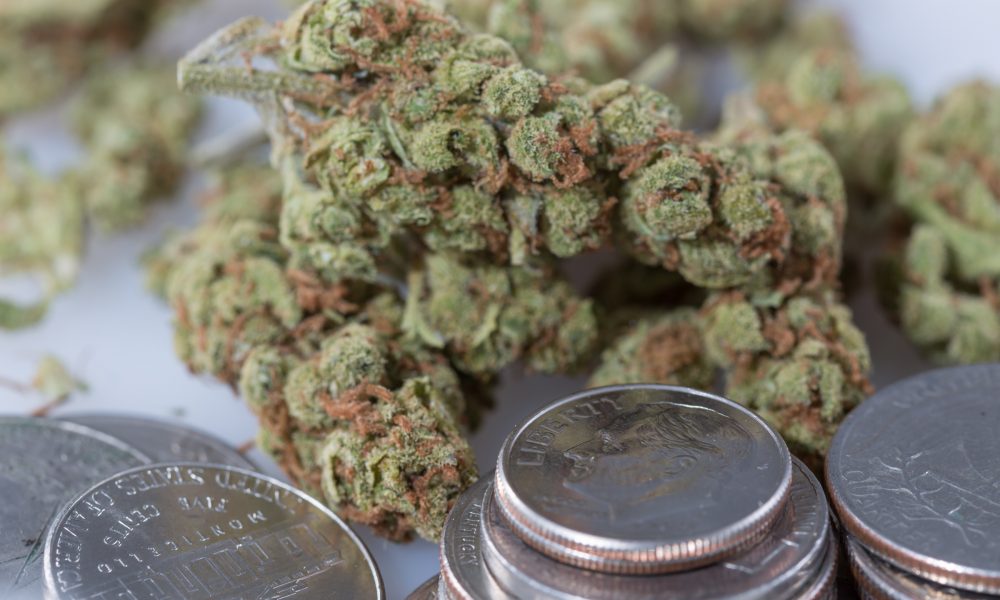Rhode Island recreational marijuana purchases smashed the state’s monthly record in December, with more than $7.8 million in adult-use sales and patients buying another $2.4 million worth of medical cannabis products.
Overall, 2023 saw more than $100 million in legal marijuana sales in the Ocean State, roughly two thirds of which were purchases by adult-use consumers.
Of the $107.8 million worth of total cannabis sales from January through December last year, adult-use sales contributed $74.2 million, while another $33.6 came from medical sales, according to the latest data from Rhode Island’s Department of Business Regulation (DBR).
While adult-use purchases have been steadily climbing since legal retailers opened their doors last December, last month’s $10.2 million in overall combined medical and recreational marijuana receipts marked a sizable increase from the previous record of $9.7 million, set in August.
In terms of sales by product type, marijuana edibles were especially popular in December, as were raw prerolls, vape carts and prepackaged cannabis flower, according to the new DBR data. Some product categories saw slower sales in December, however, including concentrates, infused prerolls and tinctures.
The average transaction price for December was $26.12—up nearly a dollar from the $25.21 average sale the month before but still almost $5 lower than January’s average of $31.01.
Rhode Island Gov. Dan McKee (D) recently celebrated the state’s first year of legal adult-use sales, which came to a close at the end of November. During that period, total sales reached $105.0 million, with almost $70 million from adult-use sales.
“A year into adult-use cannabis sales in Rhode Island, we are proud of the careful execution that defined our entry into this industry,” he said. “This success represents growing opportunity for our state’s economy but also for the nearly 70 licensed cultivators, processors, and manufacturers in the State of Rhode Island which we know are integral to our local cannabis supply chain.”
December aside, sales of medical marijuana have fallen steadily over the year—a common trend in existing medical markets once adult-use sales kick off.
As 2023 came to a close, industry advocates last month announced requests for changes to the state’s marijuana law, specifically around narrowing qualifications for social equity applicants, expanding the social equity fund with more tax revenue, allowing fee waivers and offering provisional licenses.
Regulators, meanwhile, have been seeking state and federal data to better define social equity eligibility.
In October, Rhode Island officials quietly published updated marijuana sales numbers stretching back to the launch of the state’s adult-use market in December 2022, fixing discrepancies in the figures that sometimes amounted to tens of thousands of dollars.
The adjustment came in response to a request for clarification from Marijuana Moment after the state Department of Business Regulation published its monthly sales records from September. Initially, retail totals reported by the state didn’t match up with the sum of reported medical and recreational sales.
In other drug-policy developments in the state, Rep. Brandon Potter (D) also recently introduced legislation to legalize personal possession, cultivation and sharing of psilocybin mushrooms in the state, with further changes in the state tied to federal reforms.
—
Marijuana Moment is tracking more than 900 cannabis, psychedelics and drug policy bills in state legislatures and Congress this year. Patreon supporters pledging at least $25/month get access to our interactive maps, charts and hearing calendar so they don’t miss any developments.
Learn more about our marijuana bill tracker and become a supporter on Patreon to get access.
—
Allowing noncommercial growing and sharing of psilocybin, Potter told Marijuana Moment this week, “would create the framework to have it be the most accessible model for people to actually be able to get.”
He also doesn’t want to frame the reform a change aimed at making money.
“I don’t want this to be an economically driven initiative,” he said. “This is about a care option for people, not creating a new industry for the state at the expense of people’s care.”
NCAA Division I To Vote On Removing Marijuana From Banned Substances List For Student Athletes
Read the full article here









